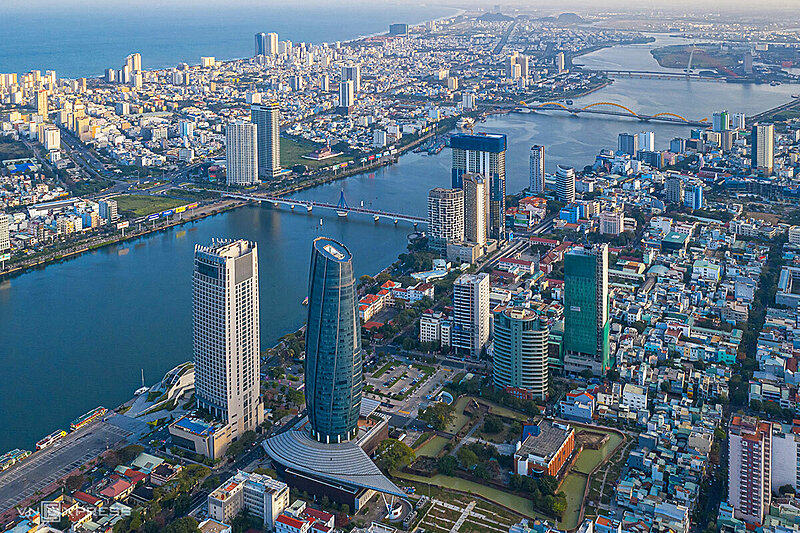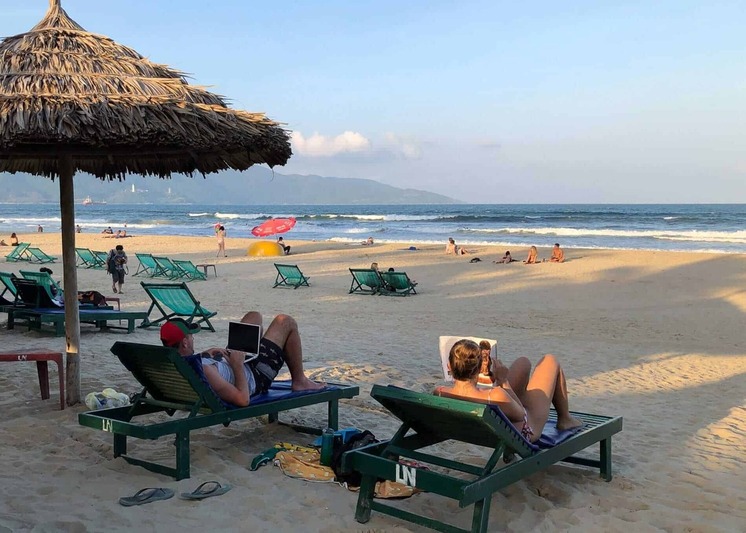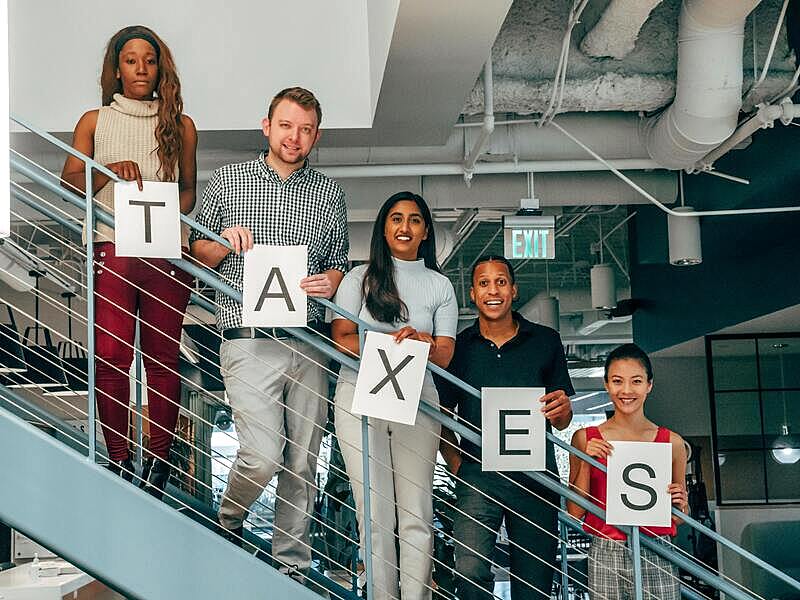Introduction
Vietnam, the "Land of the Ascending Dragon," has emerged as a hotspot for expats and digital nomads. With its stunning landscapes ranging from limestone karsts to pristine beaches, vibrant cities, rich culture, and affordable lifestyle, Vietnam offers something for everyone—from the bustling streets of Hanoi to the cosmopolitan energy of Ho Chi Minh City and the ancient charm of Hoi An.

The Famous Golden Bridge in Ba Na Hills, Da Nang - A Must-Visit Attraction
Visa Programs
Vietnam has updated its visa policies to be more favorable for expats and digital nomads. Here are the current visa options:
- Visa Exemption: Citizens of 25 countries (including Germany, France, UK, Japan, South Korea) can stay in Vietnam for up to 45 days without a visa regardless of passport type or entry purpose.
- E-Visa: Citizens of all countries and territories can apply for a 90-day multiple-entry e-visa online. Perfect for digital nomads and extended stays.
- Student Visa (DH): For those enrolled in Vietnamese educational institutions. Valid for up to 12 months.
- Business Visa (DN): For those working with Vietnamese companies or investors. Multiple entry options available.
- Work Permit & Temporary Residence Card: Required for formal employment. Work permits valid for up to 2 years.
- Permanent Residency: Available after living in Vietnam continuously with a temporary residence card. Difficult to obtain.
Premium Vietnam Business Visa Checklist
Planning to apply for a Vietnam Business visa? Our comprehensive checklist makes the process simple:
- Complete step-by-step application guide
- Business visa types and duration options
- Sponsorship and invitation letter requirements
- Extension and conversion procedures
Pro Tip: When applying for your Vietnam e-visa, use a laptop rather than a mobile device to prevent technical issues, and avoid applying on weekends when support staff are limited. Double-check that your passport has at least six months validity beyond your planned stay, and save your application code - you'll need it to check the status of your application.
Cost of Living

Cost of Living in Vietnam
Comparative Cost Breakdown
Based on latest data, the cost of living in Vietnam is significantly lower than in most Western countries. For comparison:
- Total Monthly Cost (Single Person): $617 (with rent) / $328 (without rent)
- Total Monthly Cost (Family of 4): $1,777 (with rent) / $1,098 (without rent)
- Vietnam's cost of living is 1.74 times lower than the world average
Daily Expenses
Here's what you can expect to pay for everyday items:
- Dining Out: $1.94 for lunch menu, $23.20 for dinner for two in a restaurant
- Groceries: $1.50 for a dozen eggs, $0.94 for 1kg of rice, $3.63 for 1kg of chicken breast
- Transportation: $0.31 for a one-way bus ticket, $8.69 for a monthly transport pass
- Utilities: $42.80 per month (single person), $65.90 per month (family)
- Internet: $9.05 per month (50+ Mbps)
- Mobile Phone Plan: Approximately $5-10 for a plan with calls, texts, and 28GB of data
Money-Saving Tip: Using ride-hailing apps like Grab, Be, and GoJek can save you significant amounts compared to traditional taxis. For the environmentally conscious, TNGo offers bicycle rentals throughout major cities.
Cost Variation by City
Expenses vary significantly between cities:
- Ho Chi Minh City: Most expensive at $735/month - vibrant, urban lifestyle
- Hanoi: $647/month - cultural capital with lower housing costs
- Da Nang: $593/month - beach life with moderate expenses
- Hoi An: $584/month - charming ancient town with reasonable costs
- Can Tho: $454/month - Mekong Delta living at very affordable prices
Remember that your actual expenses will depend on your lifestyle choices. Living like a local will significantly reduce your costs, while maintaining Western standards will increase your budget.
Digital Nomad Resources
Vietnam has become increasingly popular among digital nomads due to its affordable cost of living, decent internet infrastructure, and vibrant expat communities. Here are essential resources for digital nomads in Vietnam:

My Khe Beach in Da Nang - A Popular Digital Nomad Hotspot
Pro Tip: While Ho Chi Minh City and Hanoi are popular digital nomad hubs, consider Da Nang for the perfect balance of affordable living, modern amenities, and lifestyle quality. With clean beaches, less traffic, cleaner air, and a growing expat community, many long-term digital nomads find Da Nang offers the best quality of life while still maintaining fast internet and good infrastructure.
Internet & Connectivity
Vietnam offers relatively reliable internet with average speeds of 50-100 Mbps in major cities:
- Mobile Data: 4G/5G coverage is excellent in urban areas, with affordable data plans (28GB for approximately $6)
- Fiber Internet: Fixed broadband is widely available in apartments and houses with monthly packages starting from $12
- Internet Reliability: Connection quality is consistently good in major cities with occasional slowdowns during peak hours
- Internet Cafes: Vietnam has a robust coffee culture with thousands of cafes offering free WiFi
- Internet Speeds:
- Ho Chi Minh City: 30-100 Mbps average
- Hanoi: 25-80 Mbps average
- Da Nang: 30-90 Mbps average
Top Coworking Spaces
Each major city offers excellent coworking options:
Ho Chi Minh City
- Dreamplex - Multiple locations, modern facilities
- Toong Coworking Space - Beautiful design, multiple branches
- The Hive - Rooftop views and networking events
- WeWork - International standard facilities
Hanoi
- UP Coworking Space - Relaxed atmosphere, good community
- Toong - Multiple locations, stylish environment
- Hub.IT - Tech-focused space with events
- Clickspace - Affordable with good amenities
Da Nang
- Enouvo Space - Beach proximity, tech community
- DaNang Coworking Space - Central location
- IoT Space - Tech-focused with mentoring
- Hub Hoi An - Near Hoi An for scenic working
Pro Tip: Many coffee shops in Vietnam offer free WiFi and are suitable for occasional work sessions. Popular chains like Highlands Coffee, The Coffee House, and Trung Nguyen have outlets everywhere and provide reliable internet.
Popular Digital Nomad Areas
- Thao Dien (HCMC) - Expat-friendly neighborhood with numerous cafes, coworking spaces, and international amenities
- Tay Ho (Hanoi) - Lakeside district popular with expats, featuring cafes and a relaxed atmosphere
- An Thuong (Da Nang) - Beach area with many digital nomad-friendly cafes and accommodations
- Hoi An Ancient Town - Charming atmosphere with increasing nomad presence and cafes with good internet
- Dalat - Mountain retreat with cool climate, growing in popularity for longer stays
Digital Nomad Communities
Connect with fellow remote workers through:
- Facebook Groups: "Digital Nomads Vietnam," "Expats in Ho Chi Minh City/Hanoi/Da Nang"
- Meetup.com: Regular tech and digital nomad meetups in major cities
- Nomad List: Active Vietnam channels for connecting with other nomads
- Coworking Events: Most spaces host regular networking events and workshops
Banking & Mobile
Banking for Expats
Setting up banking in Vietnam is relatively straightforward for expats with the right documentation:
- Recommended Banks:
- Techcombank - English-friendly service, modern app, no monthly fees
- HSBC Vietnam - International services, but higher fees and minimum balances
- Vietcombank - Widespread ATMs, basic English service
- TPBank - Modern digital banking, English app
- Required Documents: Valid passport, visa/residence card, proof of address (rental contract), employment contract (for some banks)
- ATM Withdrawals: Domestic bank withdrawal fees are 1,000-6,000 VND (~$0.04-0.25), while international card fees range from 50,000-100,000 VND ($2-4) plus your bank's charges
- Wise (TransferWise): Popular for receiving money from abroad at competitive rates
Banking Tip: To avoid international ATM fees, consider opening a Vietnamese bank account and transferring larger sums at once. Many expats use Wise's Multi-Currency Account or Charles Schwab (for Americans) which reimburses ATM fees.
Pro Tip: For the best exchange rates when converting currency in Vietnam, avoid airports, hotels, and tourist areas. Instead, use reputable gold/jewelry shops in city centers which often offer rates 3-5% better than banks. In Ho Chi Minh City, try the shops on Nguyen Hue street, and in Hanoi, check the gold shops near Hoan Kiem Lake. Always count your money carefully before leaving.
Mobile Payment Solutions
Cash is still king in many places, but Vietnam is rapidly embracing digital payments:
- Popular E-Wallets:
- MoMo - Vietnam's largest e-wallet, supports bill payments, transfers, and merchant payments
- ZaloPay - Connected to Zalo messaging app, widely accepted
- VNPay - Integrated with many banks, popular for QR payments
- ShopeePay - Connected to Shopee e-commerce platform
- International Solutions: Apple Pay, Google Pay, and Samsung Pay are accepted at high-end retailers and restaurants
- Credit Cards: Visa, Mastercard, and JCB are widely accepted in cities at shopping malls, supermarkets, and larger restaurants
- QR Code Payments: Extremely popular, allowing payment by scanning merchant QR codes with banking/wallet apps
Mobile Phone Services
Getting connected in Vietnam is affordable and convenient:
- Major Providers:
- Viettel - Best nationwide coverage, slightly higher prices
- Vinaphone - Good coverage, competitive pricing
- Mobifone - Popular among expats, English support
- Vietnamobile - Budget option, limited coverage outside cities
- SIM Card Options: Tourist SIMs are available at airports (slightly overpriced), or you can purchase from provider stores with your passport
- Data Plans: Very affordable - 120,000 VND ($5) for 28GB/month on most carriers
- 5G Service: Available in major cities and expanding
Internet Tip: International roaming can be expensive. Purchase a local SIM upon arrival for the best rates. Most hotels, cafés, and restaurants offer free WiFi, making it easy to stay connected.
Money Transfer Services
Popular options for sending/receiving money internationally:
- Wise - Competitive exchange rates, transparent fees, bank transfer deposits
- Western Union - Cash pickup options across Vietnam
- Remitly - Competitive rates for certain corridors
- Bank Transfers - Convenient but typically higher fees and less favorable exchange rates
For better exchange rates, gold shops in city centers often offer more competitive rates than banks for currency exchange, especially for USD, EUR, and other major currencies.
Tax System

Hanoi's vibrant cityscape
Key Tax Information for Expats
- Tax Residency: If you stay in Vietnam for 183 days or more in a calendar year, you're considered a tax resident.
- Tax Rates : Vietnam uses a progressive tax system with rates ranging from 5% for the lowest income bracket to 35% for the highest. Tax residents are taxed on their worldwide income, while non-residents pay a flat 20% on Vietnam-sourced income.
- Tax ID: Required for formal employment and bank accounts.
- Social Insurance: Mandatory for employees with contracts of 1 month or longer.
Job Market and Salaries
Vietnam's growing economy offers various opportunities for expats, particularly in these sectors:
- Information Technology: $1,200 - $3,500 USD/month
- Education & ESL Teaching: $1,200 - $2,200 USD/month
- Finance & Banking: $1,500 - $4,000 USD/month
- Manufacturing & Engineering: $1,800 - $4,500 USD/month
- Hospitality & Tourism: $800 - $3,000 USD/month
- Remote Work: Varies (many expats work for foreign companies)
Job search sites: VietnamWorks, LinkedIn Vietnam
Most Popular Nomad/Expat Cities

Ho Chi Minh City

Hanoi

Hoi An
- Ho Chi Minh City: Vietnam's economic hub, offering urban living, diverse food scene, and robust expat communities.
- Hanoi: The capital city with rich culture, charming Old Quarter, and more traditional Vietnamese lifestyle.
- Da Nang: Coastal city with beautiful beaches, developing infrastructure, and growing digital nomad scene.
- Hoi An: Ancient town with preserved architecture, relaxed atmosphere, and excellent quality of life.
- Da Lat: Mountain retreat with cooler climate, nature activities, and peaceful living environment.
- Nha Trang: Coastal resort city with beautiful beaches and developed tourism infrastructure.
Pro Tip: When choosing where to base yourself in Vietnam, consider that each major city offers a distinctly different experience. Ho Chi Minh City provides the most international environment with modern amenities but more pollution and traffic. Hanoi offers the most authentic Vietnamese cultural immersion. Da Nang balances beach lifestyle with city conveniences. Visit each for at least a week before deciding on your long-term base.
Culture and Lifestyle
Vietnamese culture is deeply influenced by Confucian principles, Buddhism, and a respect for community and family. The culture emphasizes harmony, respect for elders, and the importance of saving face. This creates a generally peaceful and respectful social environment, though cultural differences can sometimes lead to misunderstandings.
- Language: Vietnamese is the official language. English proficiency varies but is growing, especially in major cities and tourist areas.
- Social Etiquette: Politeness and respect are highly valued. Avoid public displays of anger or criticism.
- Greetings: A slight bow or nod with hands together is respectful, though handshakes are becoming more common in business settings.
- Food Culture: Sharing meals is important. Food is typically served family-style with multiple dishes to share.
- Work Culture: Hierarchical, with decisions often made from the top down. Relationship-building is essential in business.
Pro Tip: Understanding the concept of "saving face" is crucial for successful integration in Vietnam. Avoid public criticism, confrontation, or causing embarrassment to others. If there's a problem, address it privately and indirectly. This cultural nuance extends to business settings too - Vietnamese colleagues may say "yes" to avoid disappointing you, even when they mean "maybe" or "it's difficult."
Healthcare
Healthcare quality in Vietnam varies significantly between urban and rural areas and between public and private facilities. Major cities like Ho Chi Minh City and Hanoi have several international-standard hospitals and clinics catering to expats.
- Public Healthcare: Affordable but often crowded with limited English-speaking staff.
- Private Healthcare: Higher quality with English-speaking doctors, but significantly more expensive.
- Health Insurance: Essential for expats. International health insurance is recommended for comprehensive coverage.
- Pharmacies: Readily available in cities. Many medications available without prescription, though quality can vary.
Recommended international-standard facilities include:
- Vinmec International Hospitals (multiple locations)
- FV Hospital (Ho Chi Minh City)
- Hanoi French Hospital (Hanoi)
- Family Medical Practice (multiple locations)
Pro Tip: For quality healthcare in Vietnam, consider membership with International SOS or establish a relationship with a trusted international clinic before you need urgent care. For prescription medications, bring a 3-month supply plus your prescription details. Many medications are available over-the-counter in Vietnam, but quality can vary - stick to larger, reputable pharmacy chains like Pharmacity or Long Châu.
Entertainment and Activities

Halong Bay, a UNESCO World Heritage Site
- Nature Exploration: Trek through Sapa's terraced rice fields, explore the caves of Phong Nha-Ke Bang National Park, or cruise through Halong Bay.
- Cultural Sites: Visit ancient temples, imperial citadels in Hue, and war memorials to understand Vietnam's rich history.
- Nightlife: Vibrant scenes in Ho Chi Minh City (Bui Vien Street) and Hanoi (Old Quarter), with everything from rooftop bars to local bia hoi spots.
- Shopping: From modern malls to traditional markets, Vietnam offers diverse shopping experiences at competitive prices.
- Food Tours: Explore street food, cooking classes, and regional cuisines across the country.
Tips for New Expats
- Visas: Plan your visa strategy early, especially for long-term stays.
- Health: Secure good health insurance, be cautious with street food initially, and stay hydrated.
- Transport: Consider a motorbike for local transport or use ride-hailing apps like Grab.
- Language: Learn basic Vietnamese phrases – locals appreciate the effort!
- Housing: Consider short-term rentals initially to explore different neighborhoods before committing long-term.
- Community: Join expat Facebook groups and networking events to build your social circle.
- Internet: Invest in reliable internet and a local SIM card with data - both are affordable and widely available.
- Respect: Learn about Vietnamese customs (removing shoes indoors, appropriate dress at temples).
Pro Tip: When first arriving in Vietnam, don't rush to sign a long-term apartment lease. Instead, stay in a serviced apartment or Airbnb for 2-4 weeks while you explore different neighborhoods and understand the city's layout. Local knowledge is critical for finding the best accommodations - join expat Facebook groups and ask for recommendations or a reliable local agent, as many of the best rentals aren't listed online.
Safety Information
Vietnam is generally considered a safe country for expats and tourists, with low rates of violent crime compared to many Western countries. However, like any destination, it's important to be aware of common safety concerns:
- Traffic Safety: Traffic is perhaps the biggest safety concern in Vietnam. Roads can be chaotic with thousands of motorbikes weaving through traffic. Always wear a helmet when riding, and consider taking licensed taxis rather than driving yourself initially.
- Petty Theft: Be vigilant against pickpocketing and bag snatching, especially in crowded tourist areas and markets. Keep valuables secure and avoid displaying expensive jewelry or electronics.
- Scams: Common scams include taxi meter rigging, fake tour operators, and overcharging. Use reputable services, agree on prices beforehand, and research typical costs.
- Natural Disasters: Vietnam experiences seasonal flooding and typhoons, particularly from June to December. Stay informed about weather forecasts during these months.
- Healthcare: While medical facilities in major cities are improving, they may not meet Western standards in all cases. Comprehensive health insurance is essential.
- General Emergency: 111 or 115
- Police: 113
- Fire: 114
- Ambulance: 115
Expat Communities & Networking
Vietnam has vibrant expat communities in all major cities, making it easier to settle in and find support:
- Facebook Groups: The most active community platforms include "Expats in Ho Chi Minh City (Saigon)," "Hanoi Massive," and "Da Nang Hoi An Expats" with thousands of members sharing advice, events, and marketplace listings.
- Meetup Events: Regular gatherings for language exchange, professional networking, and special interests are organized through Meetup.com and Facebook events.
- Language Exchanges: These offer opportunities to improve your Vietnamese while helping locals with English, creating genuine cultural connections.
- Professional Associations: Groups like AmCham, BritCham, and other country-specific chambers of commerce host networking events for professionals.
- Sports Clubs: Hash House Harriers (running), football leagues, hiking groups, and yoga communities provide ways to stay active while meeting people.
Many expats report that the community aspect is one of the most rewarding parts of living in Vietnam, with the open and welcoming nature of both locals and fellow expats making it relatively easy to build a social network.
Vietnamese Language Resources
While many expats in major cities can get by with English, learning basic Vietnamese will greatly enhance your experience and open more doors:
- Recommended Learning Resources:
- Apps: Duolingo, Memrise, and Vietnamese by VietnamesePod101.com
- Online Courses: italki (for finding tutors), Learn Vietnamese with Annie
- Books: "Elementary Vietnamese" by Binh Nhu Ngo, "Vietnamese For Beginners" by Jake Catlett
- Useful Everyday Phrases:
- Hello: Xin chào (sin chow)
- Thank you: Cảm ơn (cam un)
- Sorry/Excuse me: Xin lỗi (sin loy)
- How much?: Bao nhiêu? (bow nyew)
- Delicious: Ngon (ngon)
- Too expensive: Đắt quá (dat qua)
- Language Schools in Major Cities:
- Ho Chi Minh City: Vietnamese Language Studies, HCMC University of Social Sciences and Humanities
- Hanoi: HANU Vietnamese Language Center, 123Vietnamese
- Da Nang: Da Nang University Language Center
Vietnamese is a tonal language with six tones that can change the meaning of words, making it challenging but rewarding to learn. Most expats find that even basic phrases are appreciated by locals and help build goodwill in daily interactions.
Conclusion
Vietnam offers expats a unique blend of ancient traditions and rapid modernization, stunning natural beauty, and vibrant urban environments. With its affordable cost of living, friendly locals, and improving infrastructure, it's no wonder Vietnam has become a favorite destination for digital nomads, retirees, and adventurous professionals.
While there are challenges – including visa processes, language barriers, and cultural adjustments – most expats find the rewards of living in Vietnam far outweigh the difficulties. With proper preparation and an open mind, living in Vietnam can be an enriching and transformative experience.
*Note: All prices and information are approximate and subject to change. Always verify current information from official sources.*

